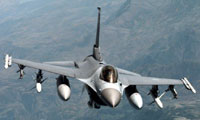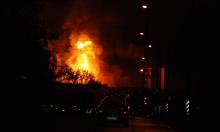America opens Iraqi airspace to Turkey; Turkish jets bomb Kurdish rebels
Turkish airstrikes targeted at Kurdish rebels far as 100 kilometers (60 miles) inside northern Iraq attacked several Iraqi villages and killed one woman.

During the three-hour offensive early Sunday, fighter jets hit rebel positions close to the border with Turkey and in the Qandil mountains, which straddles the Iraq-Iran border - and is about 100 kilometers from the frontier between Iraq and Turkey, the Turkish military said in a statement on its Web site. It said the operation was directed against the rebels and not against the local population.
As many as 50 fighter jets were involved in the airstrikes, private NTV television and other media reported. Turkey has recently attacked the area with ground-based artillery and helicopters and there have been some unconfirmed reports of airstrikes by warplanes, the AP reports.
Prime Minister Recep Tayyip Erdogan suggested Turkey could stage more attacks on Kurdistan Workers' Party, or PKK, hide-outs in northern Iraq.
"This operation, which was carried out under night conditions, was a success," Erdogan said Sunday. "Our struggle (against the PKK) will continue inside and outside Turkey with the same determination."
Turkey has massed tens of thousands of troops along its border with Iraq in response to a series of attacks by the rebels. In October, parliament voted in favor of authorizing the government to order a cross-border operation against the group, which seeks autonomy for the Kurdish minority in southeastern Turkey.
The United States and Iraq have, however, called on Turkey to avoid a major operation, fearing such an offensive could disrupt one of the most tranquil regions in Iraq.
The attack came a month after the United States promised to share intelligence with Turkey about the PKK, and Turkey's military chief, Gen. Yasar Buyukanit, said U.S. intelligence was used.
" America gave intelligence," Kanal D television quoted Buyukanit as saying. "But more importantly, America last night opened (the Iraqi) airspace to us. By opening the airspace, America gave its approval to this operation."
"Even if it's winter, even if there's snow, even if they live in caves, we'll find them and hit them," he said. "These operations will continue all the time."
The U.S. embassy in Iraq refused to comment Monday on Buyukanit's assertion that American officials had given Turkey permission to enter Iraq's air space.
Harsh winter conditions in the rugged terrain of northern Iraq reduce the possibility of a large-scale ground offensive, and Turkish attacks on the PKK are likely to be limited to airstrikes. Air raids also carry fewer military or political risks, such as hurting Turkey's alliance with the U.S. and Europe , or triggering a sharp rise in global oil prices.
In Iraq, Mohammad Hajj Hammoud, a Foreign Ministry undersecretary, summoned the Turkish ambassador and asked that Ankara end raids "that cause harm to innocent people and affect friendly bilateral relations," the ministry said on its Web site.
The raids killed one woman, wounded four and displaced several families, the ministry said.
Turkish news reports said a PKK command center in Qandil was hit.
The mountain is a base for the PKK's leadership council and the group has a network of camps around the mountain. News reports in the past weeks have suggested that PKK fighters may have dispersed from camps in northern Iraq , predicting a possible attack from Turkey .
The pro-Kurdish news agency Firat, citing the PKK, said two civilians and five PKK rebels were killed in the raids. Two schools and a hospital were destroyed, it said in separate reports, adding that the hospital had been vacated in anticipation of an attack.
The Kurdish rebels said they responded to Turkish raids with anti-aircraft artillery units, Firat reported.
Abdullah Ibrahim, a senior local official in the Iraqi administrative center of Sangasar, said Turkish warplanes bombarded 10 Kurdish villages, killing one woman and injuring two others.
"The villagers are now scared and are hiding in nearby caves. They lost all their properties," Ibrahim said.
Journalists were barred from entering the areas struck by Turkish warplanes, but some managed to sneak into the small village of Qlatooka, in Qandil, where bombs had destroyed a school and some homes.
Mukhlis Khadar, 44, said he and his family were woken by the raids and fled their home when the school was hit.
"We left an unbelievable scene behind us," Khadar said. "When we climbed the rocks of the nearby mountain ... we saw flames of fire burning our village. ... Our house disappeared."
Saoqo Mohammad, a 30-year-old woman said: "we are civilians, with no arms or any relation to the PKK - why do they allow such horrible acts against civilians?"
Turkish forces have periodically shelled across the Iraqi border, and have sometimes carried out "hot pursuits" - limited raids on the Iraqi side that sometimes last only a few hours.
The military said the airstrikes began at 1 a.m. , with all planes returning to their bases safely by around 4:15 a.m. The army then continued firing on the targets with long-range weapons, the military said.
Deputy Prime Minister Cemil Cicek urged Kurdish separatists to surrender, saying: "Come, while there's still time, return to your mothers, your fathers and your families."
Turkey is considering amending a law that pardons PKK rebels who have not been engaged in fighting and who turn themselves in.
Subscribe to Pravda.Ru Telegram channel, Facebook, RSS!




